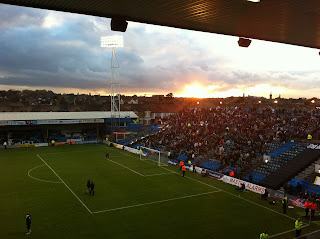 |
| The Sun sets on the 2,300 Dover fans, and on Gillingham's FA Cup run (PIC: Stephen McCaskill) |
There have been many low points in the recent history of
Gillingham Football Club but few have been as humiliating as what occurred at
Priestfield on Saturday. Gillingham were outplayed by their Kent rivals to the
extent that a casual observer would be unable to determine which team played in
the Football League and the other the Conference South. The result heaps
further pressure on under- pressure manager Andy Hessenthaler who quit Dover to rejoin Gillingham in
the summer. Many Dover fans understood that the lure of a return to the club
where he was a legend as both a manager and player was too strong to turn down
but the departure became acrimonious following Hessenthaler’s recruitment of
his former coaching staff. Ian Hendon had been appointed the new manager at the
club, but their former manager returned to recruit Hendon as his assistant and
Nicky Southall as player-coach. These actions angered the Dover faithful and
believed that it tarnished Hessenthaler’s legacy at the Kent coast club where he had secured two promotions in three years and narrowly missed out on a third.
There was a sense of inevitability that surrounded the FA
Cup 1st Round Draw and even the Dover chairman himself believed that
his side would face Gillingham. Admittedly, he predicted a home draw but
Dover’s 2,300 travelling fans comprised a third of the total attendance and
created a genuine cup atmosphere at Priestfield. As Hessenthaler came onto the
pitch he was greeted by jeers from the Dover end and applause from the
Gillingham fans while Nicky Southall was subjected to cries of ‘Judas’ from the
visitors.
A minute’s applause in the memory of Gillingham and Kent
football legend Buster Collins was held before the game and was respected by
every member of the 7,457 in attendance, the largest at Gillingham this season.
Collins joined the club in 1949 as a player and remained at the club for 60
years in various roles such as chief scout, reserve team manager and youth team
coach before sadly passing away earlier this week.
Following the tribute to a club legend, the game got
underway and Dover started the brighter of the two. The Whites went ahead thanks
to Adam Birchall’s sensational long range effort. Birchall had been in good form for Dover and
his stunning strike proved why Andy Hessenthaler had thought about bringing him to the club in the summer.
While they were impotent going forward, Gillingham were also
calamitous at the back with Dover outmuscling the opposition defenders and forcing
errors. The Whites capitalised on poor defending from John Nutter as Luke I’Anson
made it 2-0 with a tap in. Gillingham had reverted to long ball tactics in the
hope that first half substitute Adebayo Akinfenwa would be able to produce
something from often aimless passes. Boos echoed around Priestfield at the end
of the first half as Gillingham went to the dressing room to face the wrath of
their manager.
Gillingham improved markedly in the second half as they
forced a series of saves from Dover goalkeeper Ross Flitney. Danny Spiller and
Stefan Payne were both denied by Flitney who protected his team’s lead. Dover
withstood the pressure and their victory was all but assured when John Nutter
was sent off with twenty minutes to go. Baker found himself clear of the
Gillingham defence but was tackled by Nutter, who was the last man.
The crowd was noticeably deflated after the red card and
their attentions turned to Hessenthaler and Chairman Paul Scally who had
defended his record at the club earlier this week after the stadium had been vandalised. Scally
bought the club in the mid 1990s, saving it from bankruptcy and redeveloping
the stadium. Despite this The Rainham End of the ground made their feelings known,
chanting “We Want Scally Out”, to which the Dover fans humorously responded “We
Want Hessy Out”. The Whites were revelling in the disarray that their opponents
found themselves in and even optimistically sang “Que Sera, Sera”, hoping that
this would be the start of an unlikely road to Wembley.
At the final whistle, the Dover fans celebrated wildly while
another chorus of boos rang around the stadium. The Gills players looked dejected;
especially Jack Payne and many were wondering whether this was Hessenthaler’s
last game in charge. Hessenthaler has said that he will not walk away from the club despite the team’s poor form. He
will hope to turn things around at a club where he is held in high regard, but yesterday was definitely a new low in an increasingly disappointing season.
In the other ties involving Kent clubs, Dartford were a whisker away from securing a place in the Second Round. The Darts led for much of the game but League Two high-flyers Port Vale equalised in the 84th minute to send the tie into a replay. Ebbsfleet United and AFC Wimbledon played out a goalless draw after both teams were reduced to ten men. The Dons will be fired up for the replay as the winner will face either Stevenage Borough or MK Dons, whose move from London to Milton Keynes resulted in the creation of AFC Wimbledon. Hythe Town were the lowest ranked club in the first round and they were defeated 5-1 by Hereford United.


